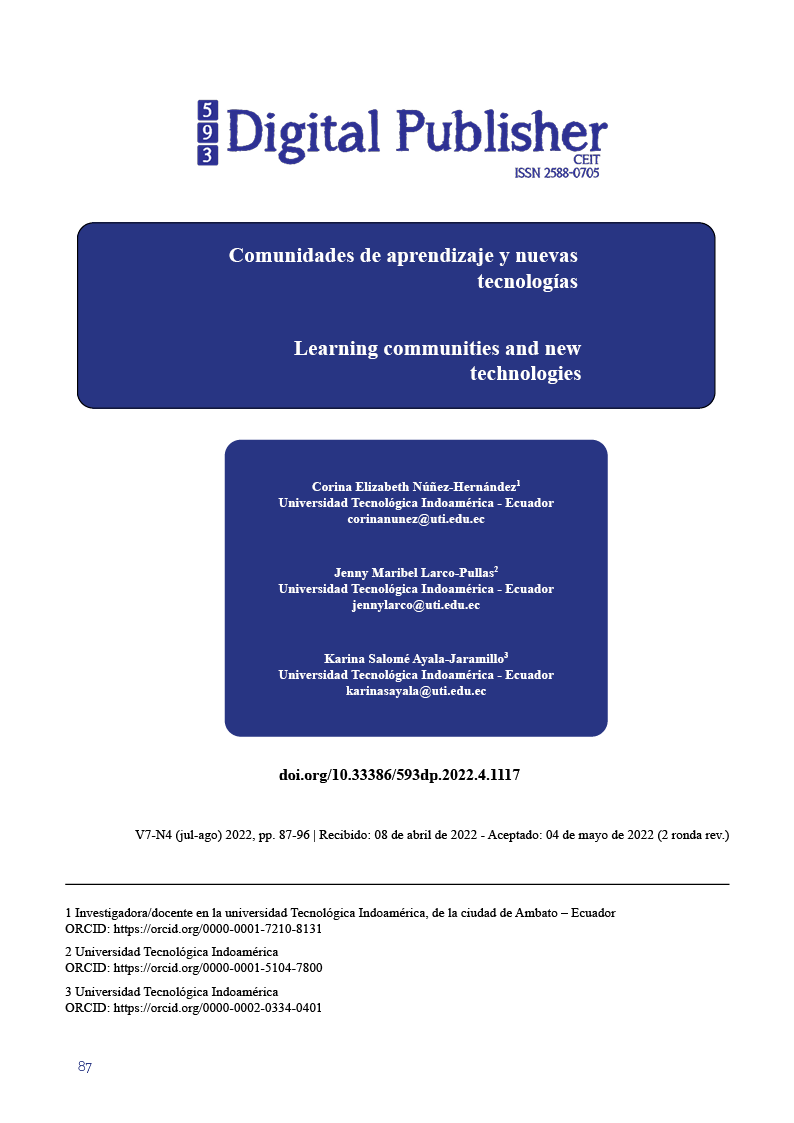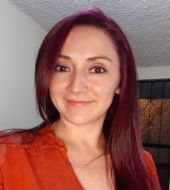Learning communities and new technologies
Main Article Content
Abstract
The learning communities together with the correct use of the new technologies open the doors to a virtual updated education because of COVID – 19 pandemic that lashes the whole world, the expected objective to be reached is the own formation of each student with the familiar and social intervention according to their own context. It must be understood that the new technologies have a great potential in the educative process and the intervention of the families is particularly important for their integrity when making working groups when searching educative transformation, which practice facilitates decision making among teachers, parents, and students to improve processes and to follow better ways to reach academic objectives. During the last months technology has become stronger in the collaborative and collective learning construction, since they facilitate the generation of spaces that promotes the ideas interchange, and they respond to academic necessities, participation rules have been defined for all the educative community that has become into a virtual community nowadays, letting the contents from different perspectives.
Downloads
Article Details

This work is licensed under a Creative Commons Attribution-NonCommercial-ShareAlike 4.0 International License.
1. Derechos de autor
Las obras que se publican en 593 Digital Publisher CEIT están sujetas a los siguientes términos:
1.1. 593 Digital Publisher CEIT, conserva los derechos patrimoniales (copyright) de las obras publicadas, favorece y permite la reutilización de las mismas bajo la licencia Licencia Creative Commons 4.0 de Reconocimiento-NoComercial-CompartirIgual 4.0, por lo cual se pueden copiar, usar, difundir, transmitir y exponer públicamente, siempre que:
1.1.a. Se cite la autoría y fuente original de su publicación (revista, editorial, URL).
1.1.b. No se usen para fines comerciales u onerosos.
1.1.c. Se mencione la existencia y especificaciones de esta licencia de uso.
References
Abreu, J. L. (2012). Hipotesis, metodo y diseño de investigacion. Daena: International Journal of Good Conscience, 7(2), 187–197.
Álvarez, P. (2011). Comunidades de aprendizaje en Latinoamérica. Transferibilidad de las actuaciones educativas de éxito. 1–325. http://www.tdx.cat/bitstream/handle/10803/294032/PAC_TESIS.pdf?sequence=1
Bañuelos, A. M., & Barrón, H. (2005). Modelos de gestión del conocimiento para la educación en línea. Apertura, 5(1), 44-53. Recuperado de https://www.redalyc.org/articulo.oa?id=68850105
Bueno & Rocha (2019). Proyecto Comunidades de Aprendizaje. USFQ Quito-Ecuador.
Calderón Pujadas, F. J. (2019). Impacto de las nuevas tecnologías en la masificación de la educación. Revista Scientific, 4(0), 173–187.
Domínguez, J. (2017). Calidad educativa en Comunidades de Aprendizaje: Participación de familiares y voluntariado. Revista Educación, Política y Sociedad, nº 2(2), julio-diciembre 2017, pp. 81-109 ISSN 2445-4109. Recuperado desde https://repositorio.uam.es/bitstream/handle/10486/679707/REPS_2_2_6.pdf?sequence=1&isAllowed=y
Andrade, R. F. (2020). Tecnologías de la información y la comunicación como mediadoras del aprendizaje: desafíos actuales. Revista EDUCA UMCH, 1(15), 10. https://doi.org/10.35756/educaumch.202015.139
Grajales G., T. (2014). Tipos de Investigación. DIVULGARE Boletín Científico de La Escuela Superior de Actopan, 1(1), 4–7. https://doi.org/10.29057/esa.v1i1.1580
Grupo Faro. (2019). Comunidades de aprendizaje. Recuperado desde https://grupofaro.org/areas-de-trabajo/comunidades-de-aprendizaje/
Grupo FARO. (2019). Nosotros. Recuperado desde https://grupofaro.org/nosotros/#1543887947332-940e7029-fb19
Instituto Natura. (2019). Comunidades de aprendizaje. Recuperado de https://www.comunidaddeaprendizaje.com.es/
Levano-Francia, L., Sanchez Diaz, S., Guillen-Aparicio, P., Tello-Cabello, S., Herrera-Paico, N., & Collantes-Inga, Z. (2019). Digital Competences and Education. Propositos y Representaciones, 7(2), 569–588.
Monasterio, D., & Briceño, M. (2020). Educación mediada por las tecnologías: un desafío ante la coyuntura del covid-19. Observador Del Conocimiento, 5(1), 136–148.
Morlá, T. (2015). Comunidades de Aprendizaje, un sueño que hace más de 35 años que transforma realidades. Social and Education History, 4(2), 137-162. Recuperado: 10.17583/hse.2015.1496
Naboa, M. (2021). Inclusión social y académica de estudiantes sordos signantes en la Pontificia Universidad Católica del Ecuador, sede Quito.
Palacio, M. (2020). Aprendizaje colaborativo con TIC y las excepciones y limitaciones al derecho de autor: Colombia. Revista La Propiedad Inmaterial, 29, 117–136. https://doi.org/10.18601/16571959.n29.05
Pizarro, P., Santana, A., & Vial, B. (2013). La participación de la familia y su vinculación en los procesos de aprendizaje de los niños y niñas en contextos escolares The Participation of the Family and its Association to Learning Processes in Children in School Contexts. Perspectivas En Psicologia, 9, 287. http://www.redalyc.org/pdf/679/67932397003.pdf
Sánchez-Aroca, M. (1999). Voices inside schools – La Verneda- Sant Martí: A school where people dare to dream. Harvard Educational Review, 69(3), 320–335. doi: 10.17763/haer.69.3.gx588q10614q3831
Siemens, G. (2004). Conectivismo: Una teoría de aprendizaje para la era digital. Conectados En El Ciberespacio, 0, 1–10. http://books.google.es/books?id=JCB0jleuU_oC
Tapscott, D. (2016). La economía digital. IEEM Revista de Negocios, 19(2), 22–26.
Valls-carol, R., Prados-gallardo, M., & Aguilera-jiménez, A. (2014). Proyecto INCLUD-ED estrategias inclusion y cohesion social Europa. 4, 2006–2011. https://revistascientificas.us.es/index.php/IE/article/view/6885
Vassallo de Lopes, M. I. (2014). La investigación de la comunicación: cuestiones epistemológicas, teóricas y metodológicas. Revista Académica de La Federación Latinoamericana de Facultades de Comunicación Social., December.
Verdún, N. (2015). Nuevas Tecnologías y Comunidades de Aprendizaje en la escuela secundaria. 1, 1–17.
Villarreal-Yazán, B., Maila-Álvarez, V., Figueroa-Cepeda, H. y Pérez-Alarcón, E. (2021). Retos y logros de la aplicación de grupos interactivos en una comunidad de aprendizaje. Revista Cátedra, 4(1), 56-80.




